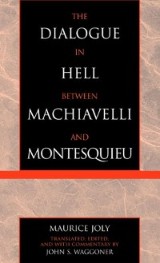Details

The Dialogue in Hell between Machiavelli and Montesquieu
Humanitarian Despotism and the Conditions of Modern TyrannyApplications of Political Theory, Band 73
|
59,99 € |
|
| Verlag: | Lexington Books |
| Format: | EPUB |
| Veröffentl.: | 04.09.2002 |
| ISBN/EAN: | 9780739154199 |
| Sprache: | englisch |
| Anzahl Seiten: | 422 |
DRM-geschütztes eBook, Sie benötigen z.B. Adobe Digital Editions und eine Adobe ID zum Lesen.
Beschreibungen
The Dialogue in Hell between Montesquieu and Machiavelli is the source of the world's most infamous literary forgery, The Protocols of the Elders of Zion. John Waggoner's superb translation of and commentary on Joly's Dialogue—the first faithful translation in English—seeks not only to update the sordid legacy of the Protocols but to redeem Joly's original work for serious study in its own right, rather than through the lens of antisemitism. Waggoner's work vindicates a man who was neither an antisemite nor a supporter of the kind of tyrannical politics the Protocols subsequently served and presents Maurice Joly, once much maligned and too long ignored, as one of the nineteenth century's foremost political thinkers.
John Waggoner's superb translation of and commentary on Joly's Dialogue—the first faithful translation in English—seeks not only to update the sordid legacy of the The Protocols of the Elders of Zion but to redeem Joly's original work for serious study in its own right, rather than through the lens of antisemitism. Waggoner's work vindicates a man who was neither an antisemite nor a supporter of the kind of tyrannical politics the Protocols subsequently served, and presents Maurice Joly, once much maligned and too long ignored, as one of the nineteenth century's foremost political thinkers.
<br>Chapter 1 Translation
<br>Chapter 2 Text of the Dialogue
<br>Chapter 3
<br>Chapter One
<br>Chapter 4
<br>Chapter Two
<br>Chapter 5
<br>Chapter Three
<br>Chapter 6
<br>Chapter Four
<br>Chapter 7 Commentary
<br>Chapter 8 The Machiavelli-Montesquieu Debate
<br>Chapter 9 The Essential Differences Between Machiavelli and Montesquieu
<br>Chapter 10 An Elaboration of the Respective Political Teachings
<br>Chapter 11 The New Machiavellian Founding
<br>Chapter 12 The Political Revolution I
<br>Chapter 13 The Political Revolution II
<br>Chapter 14 The Economic Revolution
<br>Chapter 15 The Moral Revolution
<br>Chapter 16 The Saint-Simonian Elements in the New Modes and Orders
<br>Chapter 17 The Saint-Simonian Historical Element
<br>Chapter 18 The Saint-Simonian Religious Element
<br>Chapter 19 The Drama of theDialogue
<br>Chapter 20 The Portrait of Machiavelli
<br>Chapter 21 TheDialogue and History
<br>Chapter 22 Solving the Enigma of Louis Napoleon
<br>Chapter 23 The Protocols of the Elders of Zion
<br>Chapter 24 Appendix: Macaulay's Machiavelli
<br>Chapter 2 Text of the Dialogue
<br>Chapter 3
<br>Chapter One
<br>Chapter 4
<br>Chapter Two
<br>Chapter 5
<br>Chapter Three
<br>Chapter 6
<br>Chapter Four
<br>Chapter 7 Commentary
<br>Chapter 8 The Machiavelli-Montesquieu Debate
<br>Chapter 9 The Essential Differences Between Machiavelli and Montesquieu
<br>Chapter 10 An Elaboration of the Respective Political Teachings
<br>Chapter 11 The New Machiavellian Founding
<br>Chapter 12 The Political Revolution I
<br>Chapter 13 The Political Revolution II
<br>Chapter 14 The Economic Revolution
<br>Chapter 15 The Moral Revolution
<br>Chapter 16 The Saint-Simonian Elements in the New Modes and Orders
<br>Chapter 17 The Saint-Simonian Historical Element
<br>Chapter 18 The Saint-Simonian Religious Element
<br>Chapter 19 The Drama of theDialogue
<br>Chapter 20 The Portrait of Machiavelli
<br>Chapter 21 TheDialogue and History
<br>Chapter 22 Solving the Enigma of Louis Napoleon
<br>Chapter 23 The Protocols of the Elders of Zion
<br>Chapter 24 Appendix: Macaulay's Machiavelli
John S. Waggoner has taught at the Sorbonne, the American University of Paris, and the American University of Cairo.
Diese Produkte könnten Sie auch interessieren:

Richard Saages Demokratie-Verständnis und das Schweizer Modell im Spiegel

von: Timur Makhmudov

13,99 €

Föderalismus in der Bundesrepublik Deutschland. Bundesstaatliche Unitarisierung im Zeichen der Politikverflechtung

von: Timur Makhmudov

13,99 €















